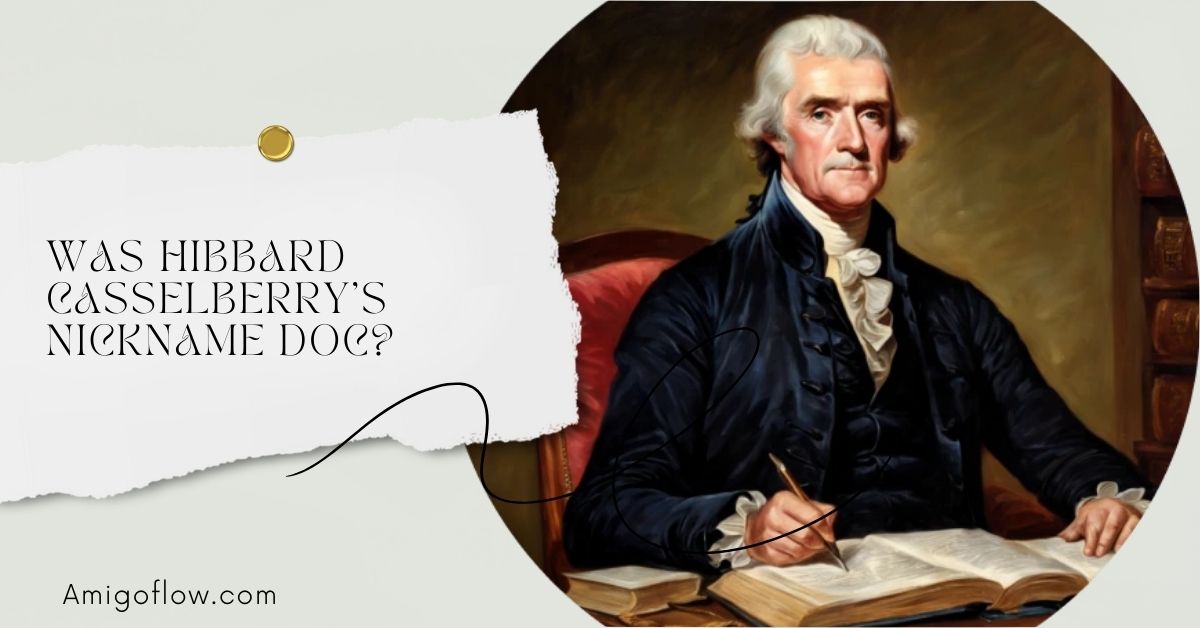Nicknames often carry significant weight, revealing aspects of an individual’s life, personality, or role in society. One such intriguing question is: Was Hibbard Casselberry’s nickname Doc?
This article explores Hibbard Casselberry, his contributions to history, and whether or not he bore the affectionate moniker “Doc.” We will look into historical records, oral histories, and analyze the cultural significance of nicknames like “Doc.”
Introduction: Who Was Hibbard Casselberry?
Hibbard Casselberry was a key figure in the early development of Casselberry, Florida. His efforts as a businessman, entrepreneur, and community leader were instrumental in transforming the region from a humble settlement into a vibrant town.
While there are no major national records documenting his life in detail, local histories describe him as a pivotal figure in laying the foundation for the infrastructure that would define the area.
Casselberry, Florida, is named in his honor—a testament to the significant impact he had on the town. However, beyond his civic contributions, there’s a question that has puzzled some historians: Was Hibbard Casselberry’s nickname Doc?
The idea of a nickname often provides more insight into how a person was perceived by those around them, revealing not just what they did, but who they were to their peers. This leads us to explore why someone like Hibbard Casselberry might have been called “Doc.”
Why Nicknames Matter: A Cultural and Historical Perspective
Nicknames are more than just casual titles or terms of endearment. In many historical contexts, nicknames reflect the character, profession, or personality of an individual. In the United States, particularly in small towns, nicknames were often tied to a person’s role in the community or to an event that stood out in their lives.
For instance, the nickname “Doc” has been widely used across various contexts in American history. Sometimes it referred to actual doctors, but in other instances, it was applied to individuals who were seen as problem solvers, trusted advisors, or leaders. Understanding the cultural and historical significance of nicknames like “Doc” can help us answer the central question: Was Hibbard Casselberry’s nickname Doc?
The Power of a Nickname
A nickname could often transcend the formal name a person was given at birth. Nicknames humanize historical figures, offering a glimpse into how their contemporaries viewed them. In Hibbard Casselberry’s case, if he was indeed called “Doc,” it likely tells us something meaningful about how he was perceived within his community.
Nicknames in Local Communities
In smaller communities, nicknames were especially prevalent. They often denoted someone’s professional skills, personal qualities, or their contributions to the community.
The nickname “Doc” could have signified Hibbard’s importance and trustworthiness in a town where people relied on one another for support and leadership. These nicknames often lasted long after the individual’s lifetime, woven into the collective memory of the community.
Was Hibbard Casselberry’s Nickname Doc? An Investigation
The question, was Hibbard Casselberry’s nickname Doc, is both intriguing and elusive. Unlike prominent national figures, there’s little written documentation directly confirming the nickname “Doc” in historical records about Casselberry. However, oral histories and local anecdotes often carry just as much weight in understanding the full picture.
Diving into the Evidence
While Hibbard Casselberry’s nickname doesn’t prominently appear in formal records, informal accounts and community memory sometimes fill the gaps left by history books. Many of these details may have been passed down through generations in Casselberry, Florida, where the town’s founder became a local legend.
Why People Believe He Was Called Doc
The belief that Hibbard Casselberry’s nickname was “Doc” likely stems from his role as a community leader. While it is not conclusively proven in documents, people often called trusted figures in small towns “Doc,” whether or not they had any medical training.
Casselberry’s extensive involvement in developing the town, solving local problems, and shaping the community could have led people to call him “Doc” as a term of respect and endearment.
The Origins of the Nickname “Doc”: Unraveling the Story
To understand why Hibbard Casselberry may have been called “Doc,” it’s important to explore the cultural origins of the nickname itself. In American history, “Doc” was often a term used for people who were either medical professionals or those who exhibited qualities of wisdom, calmness, and problem-solving ability.
Possible Origins of the Nickname
- Medical Connection: In some cases, people earned the nickname “Doc” due to their involvement in medicine. However, there is no concrete evidence suggesting that Hibbard Casselberry was a doctor. Nonetheless, the nickname could still have been applied to him if people saw him as a healer of the town’s problems or someone who brought “remedies” to local issues.
- Trusted Advisor: In many rural or small-town settings, community leaders often earned the nickname “Doc” simply because they were trusted problem solvers. If Hibbard Casselberry was a respected figure, leading town initiatives and offering guidance, this could explain why people referred to him as “Doc.”
- Cultural Affection: In some instances, “Doc” is simply a term of affection for an individual. It is possible that the townspeople of Casselberry, Florida, used the nickname to show their respect for him in an informal and endearing way.
Hibbard Casselberry’s Life and Legacy: Why He Might Have Been Called Doc
Hibbard Casselberry’s contributions to the town of Casselberry were immense. As a businessman and developer, he was instrumental in shaping the infrastructure and services available to the residents.
Community Leadership
In small communities, leadership often goes beyond politics and governance. Leaders are often seen as protectors or caretakers of the community’s well-being.
Hibbard Casselberry’s extensive involvement in the town’s growth likely made him a well-respected figure. His role as a decision-maker, strategist, and problem solver could have easily earned him the nickname “Doc,” even without a formal medical background.
Local Problem Solver
Much like a doctor is trusted to diagnose and treat health issues, community leaders like Hibbard Casselberry were trusted to identify and solve problems related to the growth and development of the town.
Whether it was through business decisions, town planning, or other initiatives, Hibbard Casselberry’s ability to steer the community in the right direction may have led to people calling him “Doc.”
The Role of Oral Histories in Preserving Nicknames
When trying to uncover whether Hibbard Casselberry’s nickname was Doc, we must consider the role of oral history in preserving such information.
Oral traditions, passed down from generation to generation, often keep alive the stories that might otherwise fade from written records. In a small town like Casselberry, Florida, oral histories could provide insights that aren’t found in formal historical documents.
Oral Traditions in Small Towns
In smaller towns, oral traditions often play a crucial role in preserving the legacies of important local figures. Hibbard Casselberry’s name might have been carried forward in the stories told by older generations to the younger ones.
It’s within these personal anecdotes and community recollections that nicknames like “Doc” might have been mentioned and preserved.
How Local Lore Can Confirm Nicknames
Many times, nicknames that aren’t officially documented survive through local lore. For Hibbard Casselberry, the nickname “Doc” might have been used in conversations, passed down informally but with a lasting impact.
In the absence of concrete written evidence, the strength of community memory plays a significant role in determining how people remember historical figures.
Historical Figures with Similar Nicknames: A Comparative Analysis
Hibbard Casselberry is not the only historical figure to be associated with the nickname “Doc.” Throughout American history, several notable individuals have carried this title, often reflecting their roles in society rather than any medical profession.
Doc Holliday
One of the most famous historical figures associated with the nickname “Doc” is Doc Holliday. Holliday was a dentist turned gambler and gunfighter in the American West. Although he was trained as a dentist, he became better known for his exploits in the Wild West, demonstrating how the nickname can be applied regardless of profession.
Doc Watson
Another prominent individual known by the nickname “Doc” is folk musician Doc Watson. He was a renowned guitarist and singer who helped popularize bluegrass and folk music in America.
Like Holliday, Watson’s nickname came from a familial source rather than his profession, illustrating how diverse the origins of the nickname can be.
Common Themes of Leadership and Community Respect
The commonality between these figures and Hibbard Casselberry lies in their roles as respected individuals in their respective communities. Just as “Doc” Holliday was seen as a prominent figure in the Wild West, and “Doc” Watson was cherished in the music community, Hibbard Casselberry could have similarly earned the nickname due to his stature in Casselberry, Florida.
Nicknames as a Symbol of Trust and Authority in American Society
Nicknames in American culture often carry connotations of trust and authority. In smaller communities, where relationships are more personal, these names often signify a bond between the individual and the community.
Nicknames Reflecting Community Dynamics
In towns like Casselberry, the nickname “Doc” could have served as a symbol of trust. Those who were called “Doc” often were perceived as leaders or knowledgeable individuals. Hibbard Casselberry’s potential nickname would likely have reflected his importance in the community and his ability to provide guidance and solutions to local challenges.
The Impact of Community Trust on Legacy
When an individual earns a nickname like “Doc,” it can significantly influence their legacy. The name can encapsulate a lifetime of achievements and relationships.
For Hibbard Casselberry, if he were indeed called “Doc,” this nickname would symbolize not just his contributions to the community but also the trust and respect he garnered from those around him.
Local and Regional Histories: How They Influence the Persistence of Nicknames
Local and regional histories play a pivotal role in determining the persistence of nicknames. Hibbard Casselberry’s impact on the town and its development likely contributed to the longevity of his nickname.
The Role of Community Memory
As time passes, community memory can either preserve or erase historical details. In the case of Hibbard Casselberry, if his nickname “Doc” was indeed common among locals, it would likely have persisted through conversations, stories, and local celebrations that honor his legacy. This creates a sense of continuity and connection to the past.
How Historical Events Shape Nickname Persistence
Certain events or milestones can also solidify nicknames within a community. If Hibbard Casselberry played a significant role in notable town events or developments, it could have further entrenched the nickname “Doc” in local lore. Historical celebrations, commemorations, or annual events might have kept the nickname alive as the town honored its history and its notable figures.
Exploring Hibbard Casselberry’s Connection to Medicine or Other “Doctor-Like” Professions
While no direct evidence links Hibbard Casselberry to the medical field, it’s worth exploring whether he had any connections that could explain the nickname “Doc.”
Investigating Medical Training or Background
Though primarily known for his work in urban development and business, it’s possible that Casselberry had some informal training or involvement with health-related activities. While this is speculative, the absence of historical documentation leaves room for interpretation.
Exploring Community Roles Beyond Medicine
It’s also essential to consider that many community leaders often assume roles that go beyond their primary professions. Hibbard Casselberry may have offered advice or assistance in various matters, earning him the reputation of a “healer” or “problem solver” in the eyes of community members, akin to a doctor.
Casselberry’s Impact on Urban Development: How His Work Earned Him Respect
Hibbard Casselberry’s influence in developing the town of Casselberry is perhaps the most concrete aspect of his legacy. As a businessman and developer, he played a significant role in shaping the infrastructure and services available to the residents.
Key Contributions to Urban Development
- Real Estate Ventures: Casselberry’s efforts in real estate development likely provided housing and commercial spaces for residents, contributing to the town’s growth.
- Community Initiatives: His involvement in local projects, possibly including parks, schools, or other public facilities, would have further established his reputation as a leader.
- Promoting Community Engagement: By fostering a sense of community and encouraging local engagement, Hibbard Casselberry became a figure residents could look up to.
Earning Respect through Civic Engagement
His work not only contributed to the physical landscape of the town but also established him as a central figure. The nickname “Doc” could symbolize the respect and admiration he earned through these contributions.
Was “Doc” an Affectionate Term for Leaders in Small Communities?
In many cases, nicknames like “Doc” serve as affectionate terms for community leaders, regardless of their professional backgrounds. Hibbard Casselberry’s involvement in town affairs might have earned him this familiar title among residents.
Familiarity Breeds Affection
In small communities, familiarity often breeds affection. People tend to feel closer to their leaders, especially those who demonstrate care for their well-being. If Casselberry was actively involved in improving the lives of residents, it’s likely that they felt comfortable calling him “Doc” as a show of endearment.
Community Dynamics and Respect
The relationship between a community and its leaders is often characterized by a mutual sense of respect and support. Hibbard Casselberry’s potential nickname “Doc” could embody the trust and camaraderie he shared with residents.
Nicknames in American History: The Role of Familiarity and Endearment
Throughout American history, nicknames have served as indicators of familiarity and endearment. They create a sense of belonging and connection within communities, particularly in small towns like Casselberry.
The Influence of Cultural Norms
Nicknames reflect cultural norms and values. In the United States, the practice of using nicknames often conveys warmth and approachability. The use of “Doc” could indicate that Casselberry was seen as someone who was not only a leader but also a friend to the community.
A Lasting Legacy of Nicknames
As time goes on, nicknames can continue to carry meaning long after the individual has passed away. If Hibbard Casselberry was indeed called “Doc,” this nickname would serve as a reminder of his contributions and the affection residents held for him.
Casselberry, Florida: How the City Keeps His Legacy Alive
The city of Casselberry, Florida, is a living testament to Hibbard Casselberry’s legacy. The very name of the city honors him, ensuring that his contributions to the community are not forgotten.
Modern Casselberry: A Growing Community
Today, Casselberry is a vibrant community with a rich history. Local events, historical societies, and community organizations often celebrate the legacy of figures like Hibbard Casselberry, ensuring that their stories continue to be told.
Preserving Local History
Various initiatives, such as community festivals or historical markers, may help preserve the town’s history, including the story of Hibbard Casselberry. This not only honors his legacy but also fosters community pride and identity.
Debunking the Myths Around Hibbard Casselberry’s Nickname
As with many historical figures, myths and misconceptions can often cloud the truth. It is important to differentiate between established facts and local lore.
Clarifying Misconceptions
While many may wonder about the origins of Hibbard Casselberry’s nickname, it’s essential to approach the topic with a critical eye. Without concrete documentation, it is easy for stories to become exaggerated or misunderstood over time.
Understanding the Nature of Oral Histories
Oral histories are valuable but can be subject to embellishments. As residents share stories about Hibbard Casselberry, the details may shift, leading to potential misunderstandings about the nickname “Doc.” The true origins may remain shrouded in mystery, making it all the more fascinating.
The Cultural Significance of Nicknames in Small-Town America
Nicknames serve as a cultural cornerstone in small-town America. They symbolize familiarity, affection, and community identity, playing a critical role in shaping social dynamics.
Building Community Connections
In small towns, nicknames often help to create a sense of belonging among residents. When individuals are known by affectionate names, it fosters camaraderie and strengthens community bonds.
Preserving Local Culture and History
As communities evolve, the stories surrounding their nicknames often become a part of their history. The nickname “Doc” for Hibbard Casselberry may symbolize not only his contributions but also the rich culture of Casselberry, Florida.
Conclusion: Was Hibbard Casselberry’s Nickname Really Doc?
In conclusion, the question was Hibbard Casselberry’s nickname Doc remains a blend of historical intrigue and community memory. While concrete evidence may be lacking, the cultural significance of nicknames in small-town America provides context for why he might have been affectionately called “Doc.”















